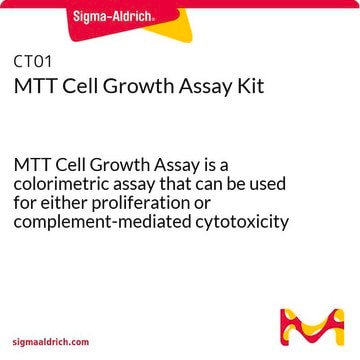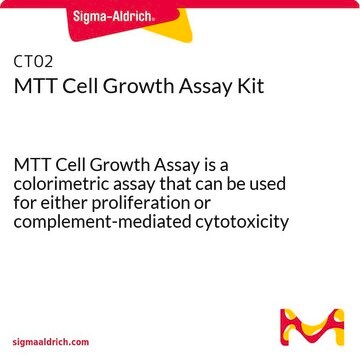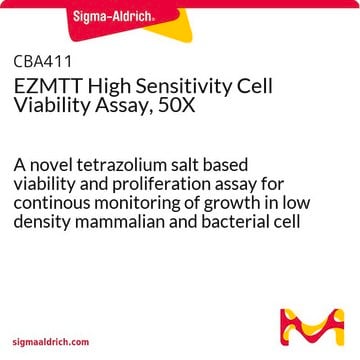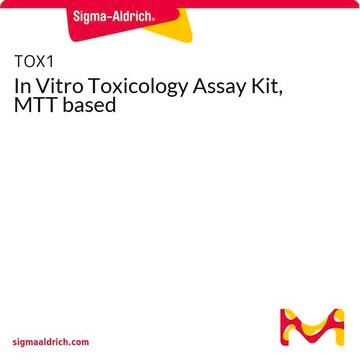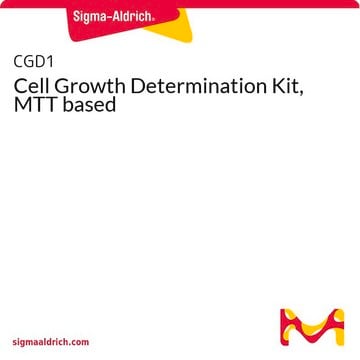CBA410
EZMTT Cell Proliferation Assay, MTT based, 200X
A novel tetrazolium salt based proliferation assay for continous monitoring of growth in mammalian and bacterial cell culture.
Se connecterpour consulter vos tarifs contractuels et ceux de votre entreprise/organisme
About This Item
Code UNSPSC :
12352207
Nomenclature NACRES :
NA.84
Produits recommandés
Méthode de détection
colorimetric
Description générale
NAD+/NADH and NADP+/NADPH are important biological cofactors for oxidoreductase enzymes that are fundamental for various biological processes, such as energy metabolism, mitochondrial function, oxidative stress, immunological functions and cell death. Hence the oxidoreductase enzymes are used as indicators of metabolic activity of cells.
EZMTT is a novel monosulfonated tetrazolium salt, 2-(3-(2-methoxy-4-nitrophenyl)-2-(4-nitrophenyl)-2H-tetrazol-3-ium-5-yl) benzenesulfonate sodium salt (EZMTT). The EZMTT reagents provided high quality and reproducible detection for oxidoreductase enzymes, indicators of cellular metabolic activity. Upon reacting with metabolic enzymes, EZMTT is converted to a yellowish formazan that does not require a solubilization step and can be measured by absorbance at 450 nm. EZMTT assay can continuously track cell proliferation and measure cytotoxicity (loss of viable cells) or cytostatic activity (shift from proliferation to quiescence) of potential medicinal or toxic agents.
Traditional tetrazolium salts, such as MTT, react with NAD(P)H-dependent cellular oxidoreductase enzymes to produce an insoluble formazan, which requires solubilization, has lower sensitivity, and is an end-point assay.
<bold>Features and Benefits of EZMTT:</bold>
• Can be premixed with any media and then directly added to the cells
• Is very stable and has little cytotoxicity. Incubation time depends on the cell number tested, if the color difference in cultures with/without cells is not obvious, a longer incubation from hours to weeks is possible.
• Reduction of EZMTT produces a water-soluble yellow colored formazan dye, which does not require solubilization step
• More sensitive than the traditional MTT assays and can track the cell growth easily (mammalian as well as bacterial cells) by absorbance at 450 nm or color changes. With longer incubation time, as little as 1 bacteria cell can be detected.
• Much less reactive with other antioxidants such as beta-Mercaptoethanol (BME)
Assay Protocol
1. Detach Hela cells and seed different cell number (0, 2500, 5000, 10000, 20000, 30000, 40000, 50000) in each well of 96-well plate with 10% FBS DMEM (100 μl) in triplicates.
2. Incubate at 37?C, 5% CO? for 3-4 hours or overnight.
3. Thaw and Mix 200 X EZMTT cell proliferation assay solution with culture media (20-fold dilution).
4. Add 10 μl of the 10X EZMTT solution to each well of the plate (final 200-fold dilution).
5. Incubate the plate for 1-4 hours in the incubator, measure the absorbance at 450 nm using a microplate reader.
EZMTT is a novel monosulfonated tetrazolium salt, 2-(3-(2-methoxy-4-nitrophenyl)-2-(4-nitrophenyl)-2H-tetrazol-3-ium-5-yl) benzenesulfonate sodium salt (EZMTT). The EZMTT reagents provided high quality and reproducible detection for oxidoreductase enzymes, indicators of cellular metabolic activity. Upon reacting with metabolic enzymes, EZMTT is converted to a yellowish formazan that does not require a solubilization step and can be measured by absorbance at 450 nm. EZMTT assay can continuously track cell proliferation and measure cytotoxicity (loss of viable cells) or cytostatic activity (shift from proliferation to quiescence) of potential medicinal or toxic agents.
Traditional tetrazolium salts, such as MTT, react with NAD(P)H-dependent cellular oxidoreductase enzymes to produce an insoluble formazan, which requires solubilization, has lower sensitivity, and is an end-point assay.
<bold>Features and Benefits of EZMTT:</bold>
• Can be premixed with any media and then directly added to the cells
• Is very stable and has little cytotoxicity. Incubation time depends on the cell number tested, if the color difference in cultures with/without cells is not obvious, a longer incubation from hours to weeks is possible.
• Reduction of EZMTT produces a water-soluble yellow colored formazan dye, which does not require solubilization step
• More sensitive than the traditional MTT assays and can track the cell growth easily (mammalian as well as bacterial cells) by absorbance at 450 nm or color changes. With longer incubation time, as little as 1 bacteria cell can be detected.
• Much less reactive with other antioxidants such as beta-Mercaptoethanol (BME)
Assay Protocol
1. Detach Hela cells and seed different cell number (0, 2500, 5000, 10000, 20000, 30000, 40000, 50000) in each well of 96-well plate with 10% FBS DMEM (100 μl) in triplicates.
2. Incubate at 37?C, 5% CO? for 3-4 hours or overnight.
3. Thaw and Mix 200 X EZMTT cell proliferation assay solution with culture media (20-fold dilution).
4. Add 10 μl of the 10X EZMTT solution to each well of the plate (final 200-fold dilution).
5. Incubate the plate for 1-4 hours in the incubator, measure the absorbance at 450 nm using a microplate reader.
Stockage et stabilité
Store EZMTT cell proliferation assay at -20°C and protect from light.
Clause de non-responsabilité
Unless otherwise stated in our catalog or other company documentation accompanying the product(s), our products are intended for research use only and are not to be used for any other purpose, which includes but is not limited to, unauthorized commercial uses, in vitro diagnostic uses, ex vivo or in vivo therapeutic uses or any type of consumption or application to humans or animals.
Code de la classe de stockage
10 - Combustible liquids
Classe de danger pour l'eau (WGK)
WGK 2
Point d'éclair (°F)
188.6 °F
Point d'éclair (°C)
87 °C
Certificats d'analyse (COA)
Recherchez un Certificats d'analyse (COA) en saisissant le numéro de lot du produit. Les numéros de lot figurent sur l'étiquette du produit après les mots "Lot" ou "Batch".
Déjà en possession de ce produit ?
Retrouvez la documentation relative aux produits que vous avez récemment achetés dans la Bibliothèque de documents.
Notre équipe de scientifiques dispose d'une expérience dans tous les secteurs de la recherche, notamment en sciences de la vie, science des matériaux, synthèse chimique, chromatographie, analyse et dans de nombreux autres domaines..
Contacter notre Service technique